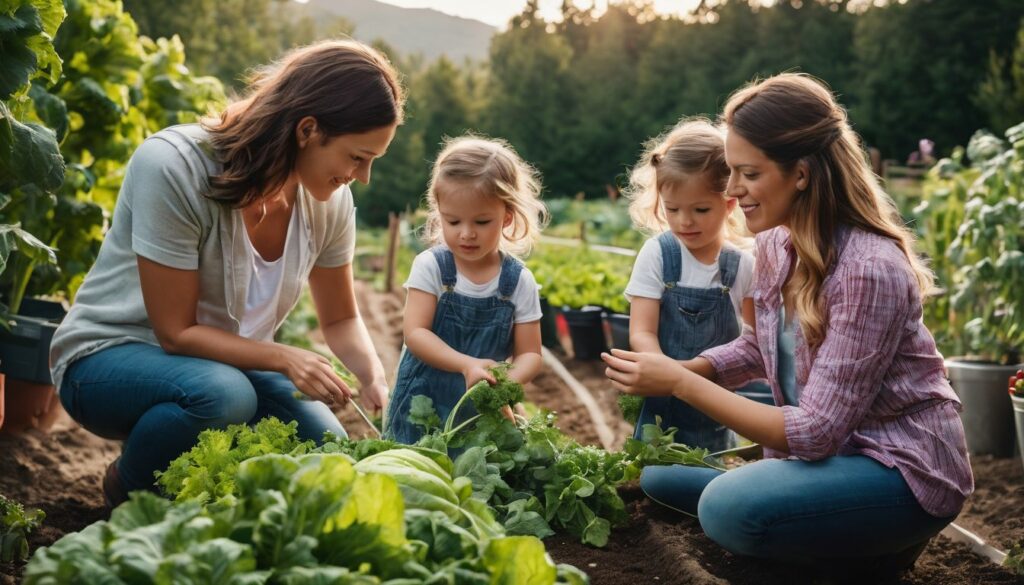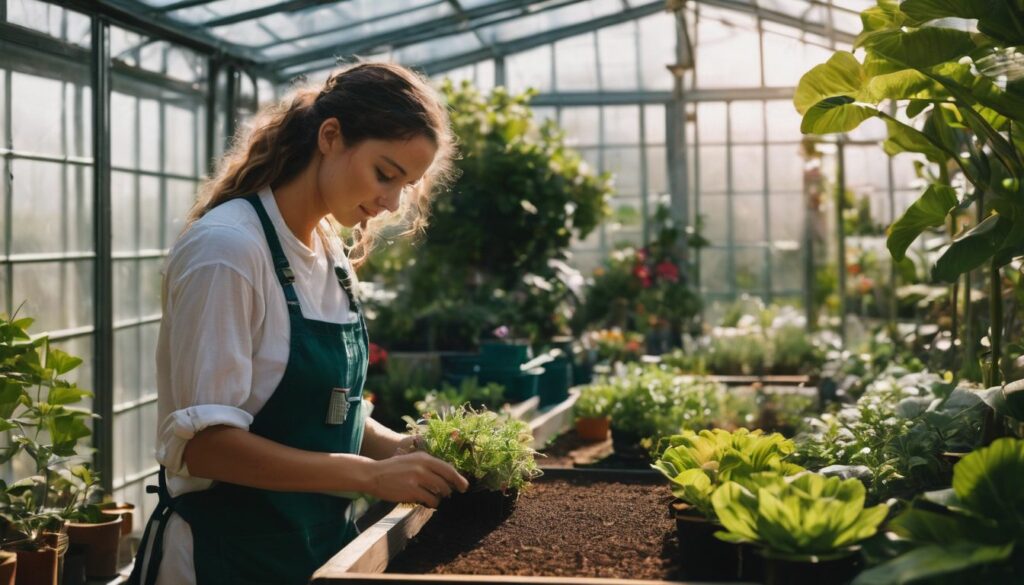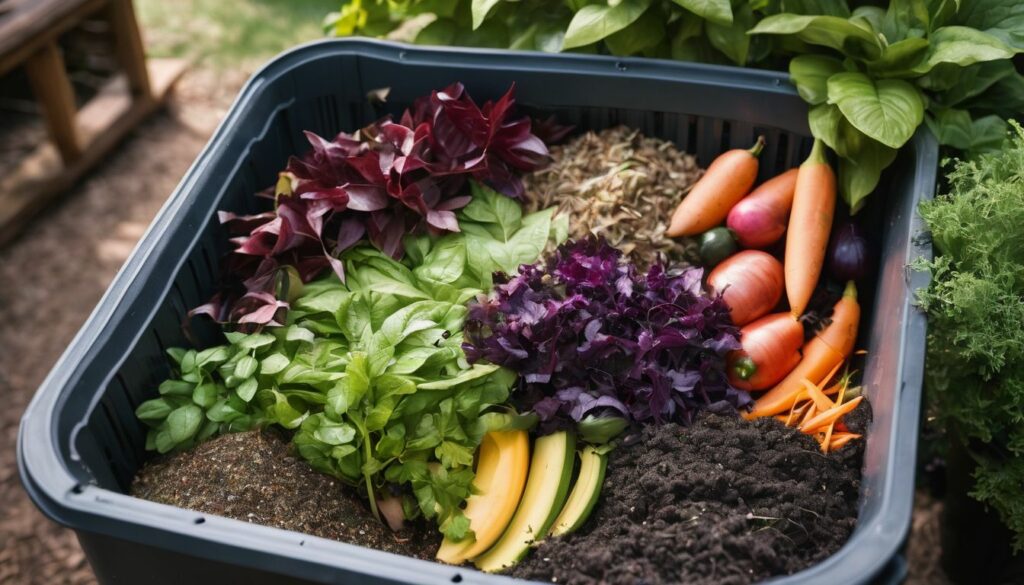Do you ever find yourself grappling with the seemingly monumental task of achieving self-sufficiency and sustainable living? Believe me, you’re not alone. I have spent countless hours diving headfirst into research and learning from my own personal experiences to demystify this journey for you.
Welcome to “Mastering Homesteading Skills: A Comprehensive Guide to Self-Sufficiency and Sustainable Living.” In this blog post, we’ll leave no stone unturned – from the artistry of homemaking right through to crucial survival skills.
Buckle up for an enriching voyage towards true independence!
Key Takeaways
- Homesteading skills, such as homemaking, sewing, and crafting homemade products like candles and soap, contribute to a self-sufficient lifestyle that saves money and reduces reliance on store-bought items.
- Kitchen and food preservation skills, including canning, cooking from scratch, and growing your own food, ensure access to fresh produce all year round while reducing waste and supporting sustainable practices.
- Raising livestock requires building shelters and coops to protect animals from harsh weather conditions and predators. Feeding them a balanced diet and providing proper care ensures their health and productivity on the homestead.
- Gardening skills are essential for growing your own food. Soil improvement techniques like adding organic matter or practicing crop rotation help maintain soil health. Natural pest control methods protect plants without harmful chemicals.
Homemaking Skills
In homesteading, mastering homemaking skills is essential for maintaining a self-sufficient and sustainable lifestyle. From laundry and cleaning to sewing and handicrafts, these skills not only contribute to the overall functionality of your home but also help reduce reliance on store-bought products.
Additionally, learning to make homemade items such as candles, soap, and lotions allows you to control the ingredients used while saving money in the process.
Laundry and Cleaning
I love taking care of my laundry and cleaning. It’s a key part of homesteading! I make sure to wash clothes by hand or in a wash machine. Dryer balls help me dry stuff fast. Line drying is also great for sunny days.
For stains, it helps to rub them out before the wash with vinegar or lemon juice.
Cleaning my home is simple too! I use safe things like baking soda, vinegar, and soap. They work well without harming our planet. Plus, they keep the house fresh and clean all day long! Doing these tasks makes sure my family always has clean clothes and a tidy home.
Sewing and Handicrafts
One important skill to master when it comes to homesteading is sewing and handicrafts. Being able to sew allows you to mend clothes, create new garments, and even make household items like curtains or blankets.
It’s a practical skill that saves money and reduces waste. Handicrafts, on the other hand, let you explore your creativity while also producing useful and beautiful items for your home.
You can try your hand at knitting, crocheting, or even making pottery. These crafts not only provide a sense of accomplishment but also help add personal touches to your homestead.
Homemade Products (candles, soap, lotions)
In the homesteading journey, learning to make homemade products like candles, soap, and lotions is an essential skill. By creating these items ourselves, we can avoid harmful chemicals and reduce waste.
Making candles allows us to add cozy ambiance to our homes using natural ingredients like beeswax or soy wax and essential oils for fragrance. Soap-making lets us customize our soaps with nourishing oils and herbs, ensuring gentle cleansing for our skin.
And crafting our own lotions means we have control over the ingredients that go onto our bodies, using moisturizing oils and botanical extracts. These homemade products not only promote self-sufficiency but also allow us to lead a more sustainable lifestyle by reducing our reliance on store-bought alternatives filled with additives and plastic packaging.
Kitchen and Food Preservation Skills
In this section, we will learn essential skills such as canning and preservation methods, cooking and baking from scratch, and growing and harvesting food.
Canning and Preservation Methods
Canning and preservation methods are essential skills for self-sufficiency and sustainable living. In “Mastering Homesteading Skills,” I discuss various techniques to preserve food, ensuring that it lasts longer and remains nutritious.
These methods include canning, dehydrating, pickling, and fermenting. Canning involves sealing food in jars or cans after heating it to kill bacteria and other microorganisms. Dehydrating removes moisture from the food to prevent spoilage, while pickling uses vinegar or brine to preserve fruits and vegetables.
Fermentation preserves foods by allowing beneficial bacteria to break down sugars into acids, creating an acidic environment that inhibits the growth of harmful bacteria. By mastering these preservation techniques, you can reduce waste, save money on groceries, and enjoy homegrown produce all year round.”.
Cooking and Baking from Scratch
In “Mastering Homesteading Skills,” I provide valuable guidance on cooking and baking from scratch. With this skill, you can create delicious meals and treats using basic ingredients without relying on processed or pre-packaged foods.
It’s all about getting back to the basics of food preparation. I emphasize the importance of knowing where your food comes from and being able to control the ingredients you use.
In the book, I share practical tips for growing your own herbs and vegetables to use in your homemade dishes. I also discuss the benefits of freshly milling whole grains for bread-making and how to incorporate natural sweeteners like honey or maple syrup into your recipes instead of refined sugars.
Growing and Harvesting Food
Growing and harvesting food is a fundamental aspect of homesteading and self-sufficiency. It allows individuals to have control over what they eat and ensures access to fresh, nutritious produce.
In “Mastering Homesteading Skills”, I provide practical guidance on growing your own food, from choosing the right seeds or seedlings to planting them in nutrient-rich soil. The book also covers essential techniques for caring for your plants, such as watering, fertilizing, and protecting them from pests.
When it comes time to harvest, you’ll learn how to properly pick fruits and vegetables at peak ripeness. By mastering these skills, you can enjoy the satisfaction of providing nourishing food for yourself and your family while reducing reliance on external sources.
Livestock and Animal Husbandry Skills
Learn how to raise chickens, rabbits, and other livestock, build shelters and coops, and master feeding and care techniques for a self-sufficient homesteading lifestyle. Don’t miss out on these essential skills for sustainable living!
Raising Chickens, Rabbits, and other Livestock
Raising chickens, rabbits, and other livestock is an essential skill for homesteading. It provides a sustainable source of food, such as eggs and meat, while also allowing you to connect with nature.
Building shelters and coops is necessary to protect the animals from harsh weather conditions and predators. Feeding and caring for them involves providing proper nutrition and ensuring their well-being.
By raising your own animals, you can have a more self-sufficient lifestyle and enjoy the benefits of fresh, organic produce right in your backyard.
Building Shelters and Coops
When it comes to homesteading, building shelters and coops for your livestock is essential. I have learned that providing adequate shelter ensures the safety and well-being of your animals throughout the year.
A sturdy shelter protects them from harsh weather conditions, predators, and provides a comfortable space for rest. In my book, “Mastering Homesteading Skills,” I provide practical guidance on constructing shelters and coops using materials readily available on your homestead or in your local area.
I emphasize the importance of proper ventilation, insulation, and structural integrity to create a safe haven for your animals. By following the step-by-step instructions and tips outlined in my book, you’ll be able to build shelters and coops that meet the needs of your specific livestock while also maximizing their comfort and safety.
Feeding and Care Techniques
To ensure the health and well-being of your livestock on the homestead, it is essential to master feeding and care techniques. Proper nutrition is crucial for their growth and productivity.
I provide practical guidance in my book “Mastering Homesteading Skills” on how to feed your animals a balanced diet using a combination of commercial feeds and natural sources. Additionally, it is important to establish a regular feeding schedule to maintain consistency.
Along with nutrition, caring for your animals involves providing clean water, shelter from extreme weather conditions, regular grooming, and monitoring for any signs of illness or injury.
Gardening Skills
In gardening skills, I will cover everything you need to know about growing your own food, improving soil health, and using natural methods for pest control.
Growing Your Own Food
Growing your own food is a key skill for self-sufficiency and sustainable living. It allows you to have control over what you eat and ensures the availability of fresh produce right from your backyard.
In “Mastering Homesteading Skills,” I provide practical guidance on how to start your vegetable garden, including choosing the right plants, preparing the soil, and maintaining proper watering and care techniques.
You’ll also learn about natural pest control methods to protect your crops without harmful chemicals. By growing your own food, you can reduce reliance on grocery stores, save money on organic produce, and enjoy the satisfaction of harvesting your homegrown vegetables.
Soil Improvement and Propagation Techniques
In the gardening section of my book, “Mastering Homesteading Skills: A Comprehensive Guide to Self-Sufficiency and Sustainable Living,” I discuss the importance of soil improvement and propagation techniques.
Good soil is essential for growing healthy plants, and there are several ways to improve it. One method is by adding organic matter, such as compost or manure, which enriches the soil with nutrients.
Another technique is crop rotation, where you alternate planting different crops each season to prevent nutrient depletion. Additionally, propagating plants through methods like seed sowing or stem cuttings allows you to expand your garden without spending extra money on new plants.
Natural Pest Control
In homesteading, natural pest control is an important skill to learn. Instead of relying on harmful chemicals, we can use natural methods to keep pests away from our gardens and crops.
One effective method is companion planting, where we plant certain crops together that repel insects or attract beneficial bugs. For example, planting marigolds around your tomatoes can deter aphids and nematodes.
Another technique is using homemade organic sprays made from ingredients like garlic, onion, neem oil, or hot pepper flakes. These sprays are safe for both humans and the environment while effectively keeping pests at bay.
Survival and First Aid Skills
Learn essential skills such as foraging and hunting, basic first aid and natural remedies, and survival techniques to ensure self-sufficiency in emergencies.
Foraging and Hunting
Foraging and hunting are essential skills for homesteaders aiming to live self-sufficiently. In my book, “Mastering Homesteading Skills,” I provide valuable guidance on mastering these skills.
Foraging involves gathering wild plants, herbs, berries, and mushrooms from the surrounding environment for food or medicinal purposes. It’s crucial to learn how to identify edible plants and understand their nutritional value.
Hunting is another important skill that allows you to supplement your diet with fresh meat. Learning about proper hunting techniques, such as tracking and weapon handling, is vital for success.
Basic First Aid and Natural Remedies
When it comes to homesteading, knowing basic first aid and natural remedies is essential for a self-sufficient lifestyle. In “Mastering Homesteading Skills,” I delve into the importance of being prepared for emergencies and providing immediate care when needed.
The book covers fundamental first aid techniques such as bandaging wounds, treating burns, and performing CPR. Additionally, I share valuable information on natural remedies using herbs, plants, and other resources readily available on your homestead.
These remedies can be used to alleviate common ailments like coughs, fevers, and headaches. Having this knowledge empowers you to take care of yourself and your loved ones in times of need while embracing the healing power of nature.
Survival Techniques and Strategies
In this section, I will share some important survival techniques and strategies that are essential for homesteading. It’s crucial to learn how to forage and hunt for food in case of emergencies.
Knowing basic first aid skills and natural remedies can also come in handy when medical assistance is not readily available. Additionally, understanding survival techniques such as building shelters and finding sources of clean water is vital for self-sufficiency.
By acquiring these skills, we can increase our chances of successfully navigating through challenging situations while living off the land.
Conclusion
In conclusion, “Mastering Homesteading Skills: A Comprehensive Guide to Self-Sufficiency and Sustainable Living” by Dion Rosser is a valuable resource for anyone interested in homesteading.
It covers essential skills such as homemaking, food preservation, animal husbandry, gardening, survival techniques, and more. With practical guidance and a focus on sustainability, this book empowers readers to lead a self-sufficient lifestyle and create a flourishing haven of self-sufficiency.
FAQs
1. What does self-sufficiency in homesteading mean?
Self-sufficiency in homesteading means relying on DIY skills like hunting, foraging, farming, and cooking from scratch to live off the grid.
2. How does animal and livestock raising fit into self-reliance?
In a self-reliant lifestyle, animal and livestock raising provides food sources through meat, eggs or dairy products; it also contributes to agriculture by helping with tasks like composting.
3. Why are canning and preserving important for sustainable living?
Canning and preserving let you save your farm produce for longer time. This is crucial for sustainable living as it reduces waste while ensuring a steady food supply during non-growing seasons.
4. How can I use permaculture practices in my home?
Permaculture practices help maintain a balanced ecosystem on your land by cleverly using natural resources; you can do things like creating green building designs or setting up beekeeping stations in your yard.
5 .What kind of medicinal solutions does off-grid living provide?
Off-grid living often involves making herbal medicines from plants grown at home which may serve as natural remedies for many common health issues.





